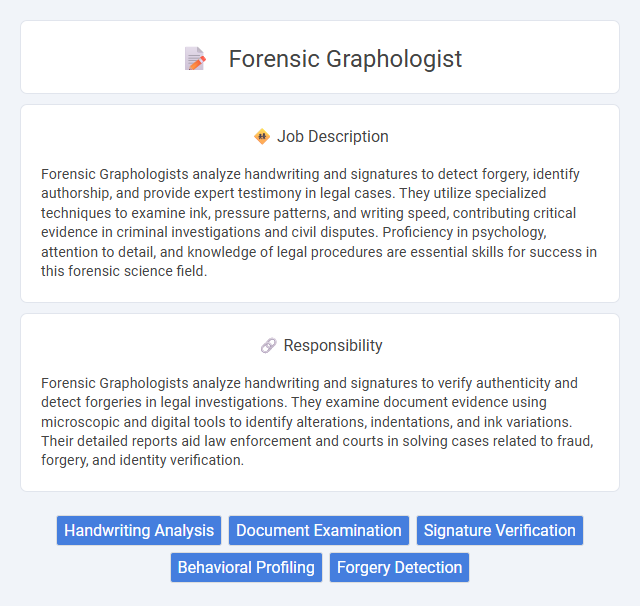
Forensic Graphologists analyze handwriting and signatures to detect forgery, identify authorship, and provide expert testimony in legal cases. They utilize specialized techniques to examine ink, pressure patterns, and writing speed, contributing critical evidence in criminal investigations and civil disputes. Proficiency in psychology, attention to detail, and knowledge of legal procedures are essential skills for success in this forensic science field.
Individuals with strong analytical skills and a keen eye for detail are likely well-suited for a career as a forensic graphologist. Those who have a genuine interest in psychology and human behavior may find this role aligns with their strengths, as it involves interpreting handwriting to assess authenticity and detect forgeries. However, people who struggle with meticulous observation or lack patience for in-depth examinations might find it challenging to thrive in this profession.
Qualification
A Forensic Graphologist typically requires a degree in forensic science, criminology, psychology, or a related field, complemented by specialized training in handwriting analysis and document examination. Certification from recognized bodies such as the American Board of Forensic Document Examiners (ABFDE) enhances credibility and career prospects. Proficiency in pattern recognition, attention to detail, and knowledge of legal procedures are essential qualifications for accurate forensic handwriting interpretation.
Responsibility
Forensic Graphologists analyze handwriting and signatures to verify authenticity and detect forgeries in legal investigations. They examine document evidence using microscopic and digital tools to identify alterations, indentations, and ink variations. Their detailed reports aid law enforcement and courts in solving cases related to fraud, forgery, and identity verification.
Benefit
Forensic graphologists likely provide critical insights by analyzing handwriting to verify the authenticity of documents, which can significantly aid legal investigations. Their expertise may reduce the risk of fraud and support the resolution of disputes by offering credible evidence in courts. Employing a forensic graphologist might increase the accuracy and reliability of document examination in criminal and civil cases.
Challenge
The forensic graphologist likely faces the challenge of accurately analyzing handwriting under varying conditions, where subtle details can significantly influence conclusions. The probability of encountering ambiguous or forged samples increases the complexity of their work, requiring meticulous attention to detail. Mastery in distinguishing genuine handwriting traits from intentional alterations is essential to support reliable legal outcomes.
Career Advancement
Forensic graphologists analyze handwriting to assist in criminal investigations, offering vital expertise in legal proceedings. Career advancement often involves specializing in fraud detection, document authentication, or collaborating with law enforcement agencies to enhance casework impact. Pursuing certifications from recognized organizations and gaining experience in forensic labs or legal consulting can elevate professional standing and open opportunities for teaching or expert witness roles.
Key Terms
Handwriting Analysis
Forensic graphologists specialize in handwriting analysis to authenticate documents and identify forgeries in legal investigations. Their expertise involves examining stroke patterns, pressure, and letter formations to determine the authorship of questioned writings. This specialized skill set supports criminal cases, fraud detection, and dispute resolutions by providing objective, scientifically-backed handwriting evaluations.
Document Examination
Forensic graphologists specialize in document examination by analyzing handwriting, signatures, and other written materials to authenticate documents and detect forgeries. They apply advanced techniques such as microscopic analysis, ink dating, and pressure pattern evaluation to identify inconsistencies and fraudulent alterations. This expertise supports legal investigations by providing crucial evidence in criminal and civil cases involving disputed documents.
Signature Verification
Forensic graphologists specialize in signature verification by analyzing handwriting characteristics to detect forgeries and confirm authenticity in legal cases. They examine stroke pressure, letter formation, and unique writing patterns, providing expert testimony in court to support fraud investigations and document validation. Precision in identifying anomalies within signatures aids law enforcement agencies and financial institutions in preventing forgery-related crimes.
Behavioral Profiling
Forensic graphologists analyze handwriting to uncover psychological traits and behavioral patterns crucial for criminal investigations. They examine letter formations, spacing, and pressure to build accurate behavioral profiles that assist law enforcement in identifying suspects or understanding motives. This specialized expertise supports forensic teams by providing insights into personality characteristics and potential deception.
Forgery Detection
Forensic graphologists specialize in analyzing handwriting to detect forgery and document fraud, utilizing advanced techniques such as microscopic examination and ink composition analysis. They collaborate with law enforcement agencies to verify the authenticity of signatures, wills, contracts, and financial documents, providing expert testimony in court cases. Proficiency in pattern recognition and understanding of psychological factors influencing handwriting are essential skills for effective forgery detection.
 kuljobs.com
kuljobs.com